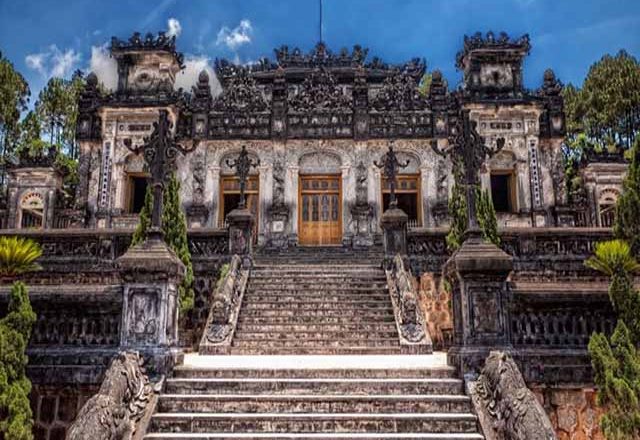Khai Dinh Tomb Overview
Khai Dinh Tomb, officially known as the Ứng Mausoleum, is situated in Chau Chu Mountain, about 10km away from Hue city, Vietnam. The tomb is the smallest, but most costly and recent one in comparison with other tombs of Nguyen royals. It was established by Emperor Khai Dinh, the 12th Emperor of the Nguyễn Dynast, during the period from 1920 to 1931. This 11-year-to-complete tomb is located hillside and has a combination of Eastern and Western style in terms of architecture. Khai Dinh Tomb is considered one of the most worth-visiting Hue attractions. Join Hue to Hoi An Jeep Tour to understand more Tu Duc Tomb.
History of Khai Dinh Tomb
Khai Dinh became Vietnam’s penultimate emperor from 1916 to 1925, but was not popular amongst Vietnamese people due to his close collaboration with the government of France (he was widely seen as a puppet of the French).

Similar to some Vietnamese emperors, Khai Dinh also prepared a tomb carefully in anticipation of his death. The monument was impacted strongly by French architecture style, shown through the Oriental mausoleum, as the most noticeable proof of this European influence. To be able to complete the mausoleum, the principles had to increase the national tax to 30%. This tomb was accomplished in 1931 by Bao Dai, the successor of Khai Dinh.
Best Time to Visit Khai Dinh Tomb
Tourists can visit Khai Dinh tomb all year round. The ticket price is even free during big holidays like National Day (September 2nd) and the first of Lunar New Year.

Architecture of Khai Dinh Tomb
The tomb is a rectangular monument leaning against Chau Chu Mountain in the rural area of Hue city. Built from modern materials like slates, concrete and wrought iron, the tomb has a relatively gray and imposing appearance.

Inside the tomb, side walls are featured with the biggest sculptures of dragons throughout Vietnam.
Most of the grandiose exterior of the tomb is covered in the weathered, darkened concrete, with an unexpectedly Gothic air. In contrast, the interiors look like explosions of colorful ceramic mosaics.
Stepping into the Honour Courtyard, you will see many mandarin honour guards with a mixture of European and Vietnamese features. Going up further 3 flights of stairs, you will head to the most notable place of the tomb named Thien Dinh palace, the stupendous main building, with the ceiling and walls decorated with murals of the Four Seasons, Eight Precious Objects and the Eight Immortals.
Below the graceless, gold-speckled concrete canopy, there is a gilt bronze statue of the King Khai Dinh, who was thought to have homosexual despite he produced a heir. The remains of the King were interred about 18 meters below the statue.

Indeed, the hard, isolated materials, through the skillful hands of artisans, have become vivid, soft and brilliant works of art.
All of the decoration inside Thien Dinh not only reflects the cultural and art values, but also represents the concept of the establishment and the idea of the King. In addition to the decorative items drawn from Confucian texts and royal life, there are also Taoist decorations, particularly hundreds of swastikas, a symbol of the Buddha, produced by the Green glass.
Artist Phan Van Tanh was the main person responsible for the creation of the masterpieces of art in Khai Dinh mausoleum. He was also the author of the three almost largest murals in Vietnam, “Cửu Long ẩn vân” (Nine dragons amidst fleeting clouds) decorated under the ceiling of the three middle house of Thien Dinh palace.
Khai Dinh Tomb Map
How to Get to Khai Dinh Tomb?
Khai Dinh tomb is 10km away from Hue city center. Unlike Minh Mang and Tu Duc tomb, which can be accessed by boat, Khai Dinh Tomb is a little away from the river; therefore, it is better to get there by road. Nonetheless, you can still get there by boat, but it takes time about 45 minutes. If you are short in time, you can get to Khai Dinh Mausoleum by a taxi and motorbike taxi. But the best way is to book Hue City Tour 1 day with local private tour guide via Hue to Hoi An Jeep Tour.

